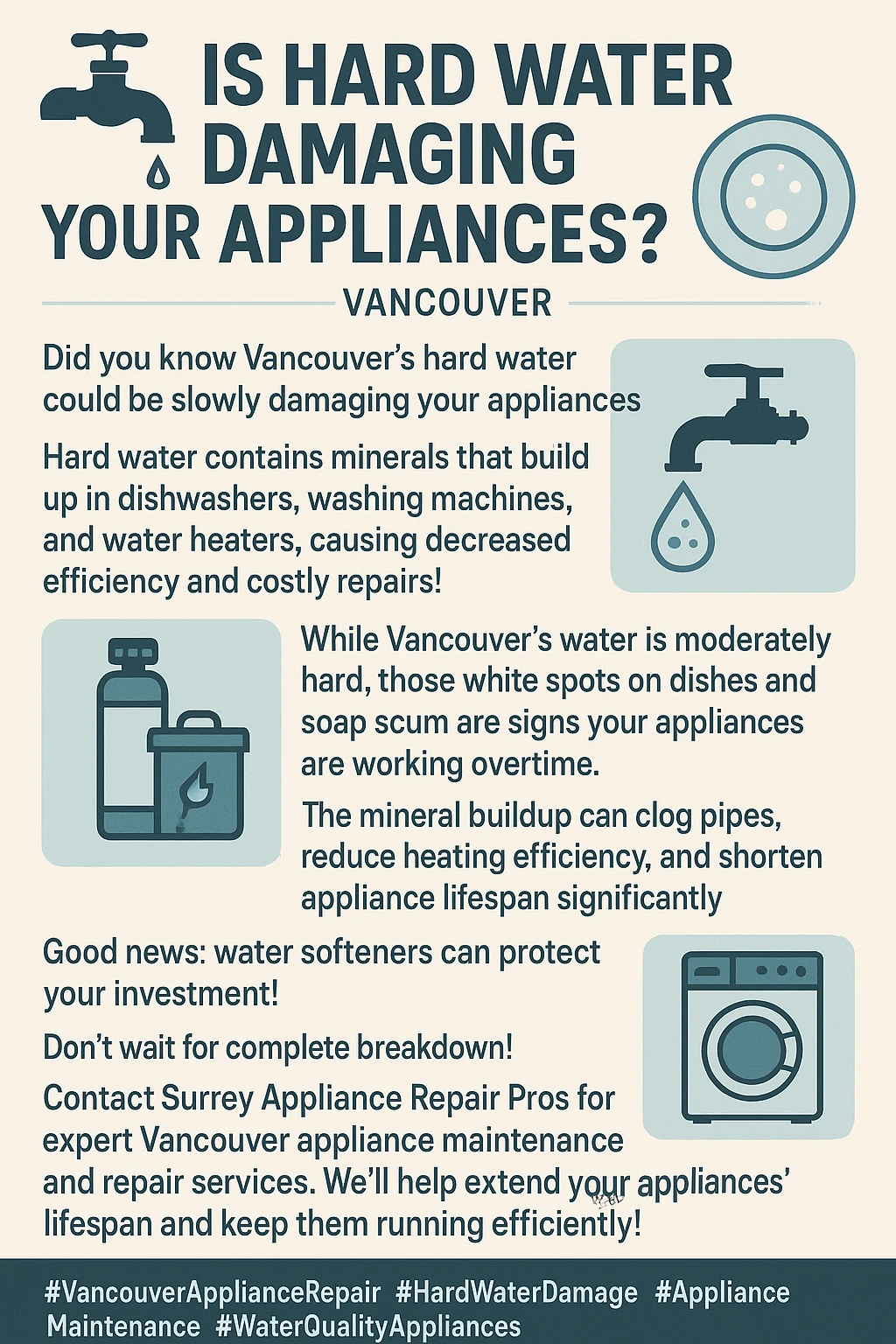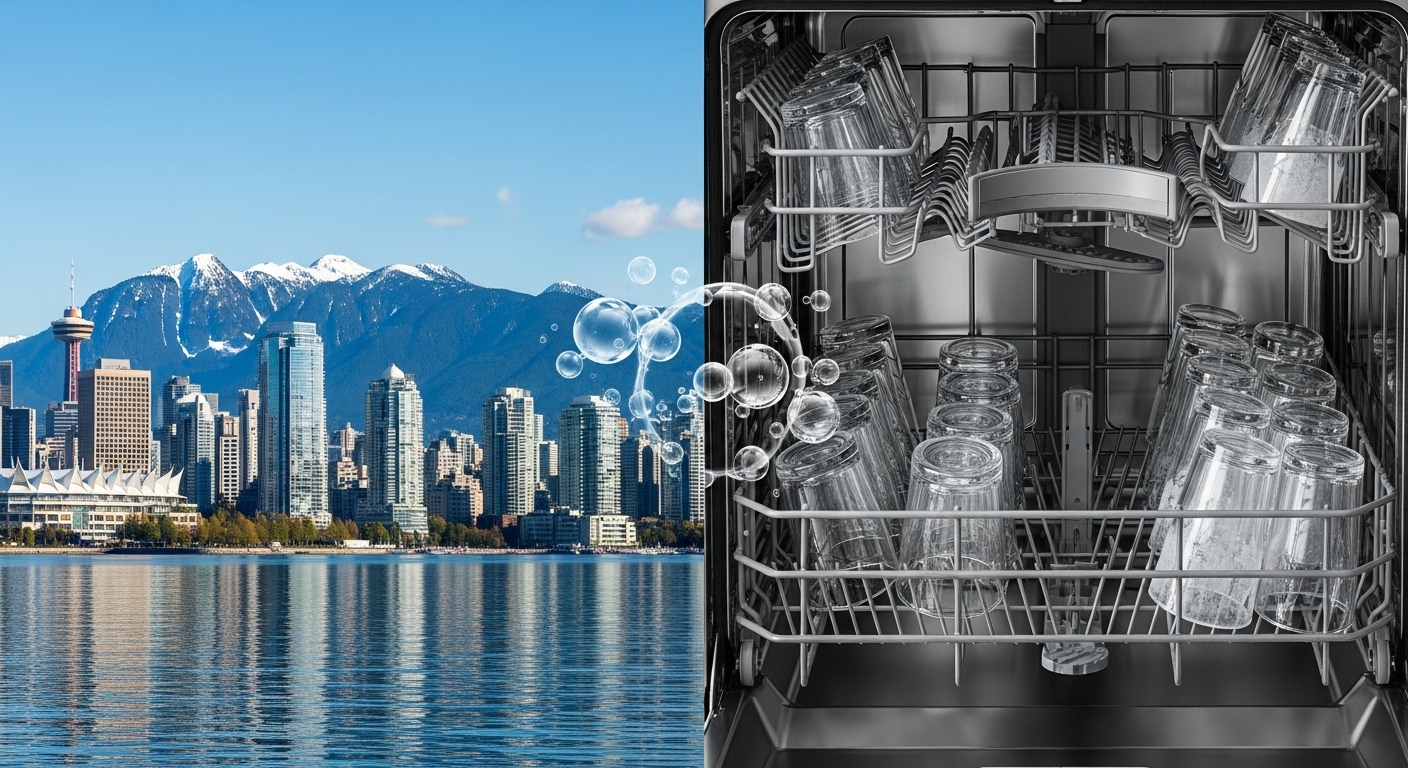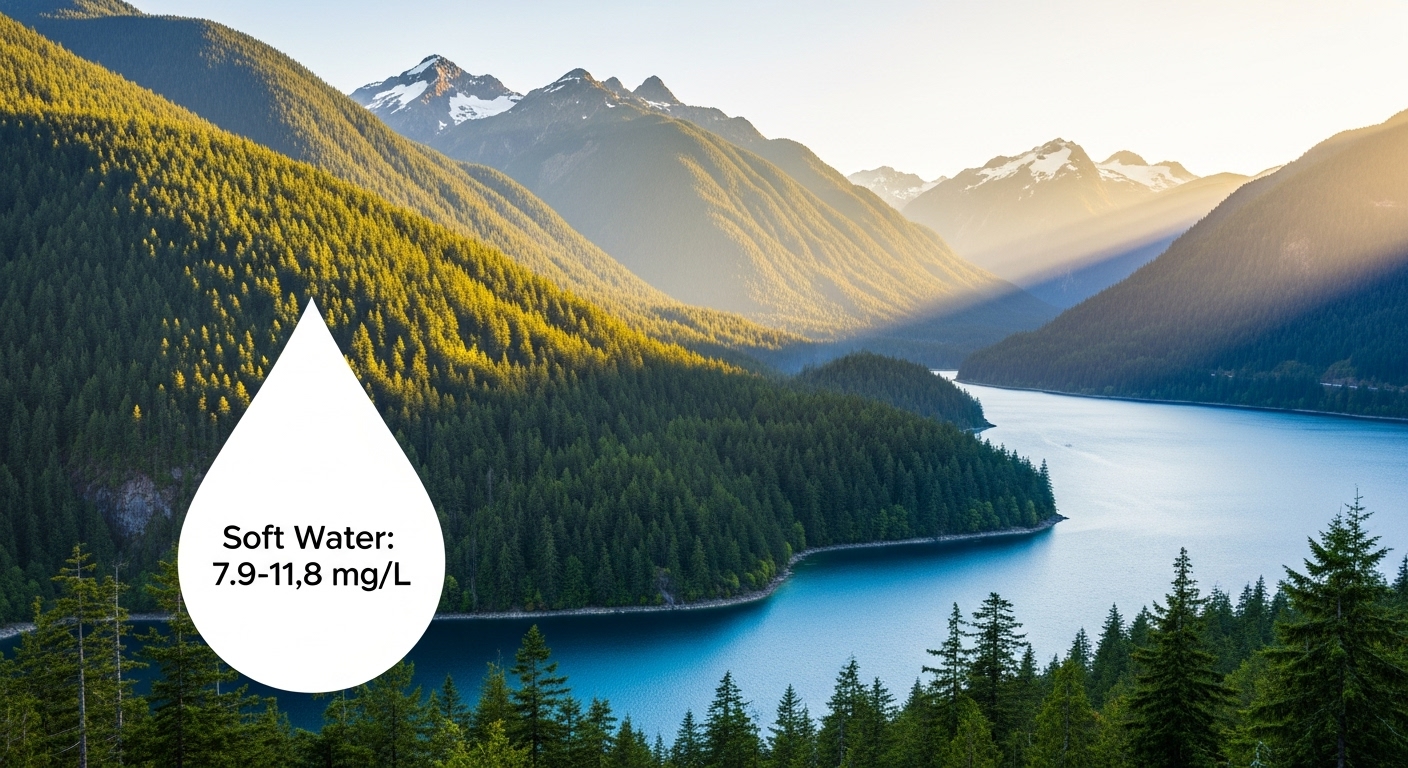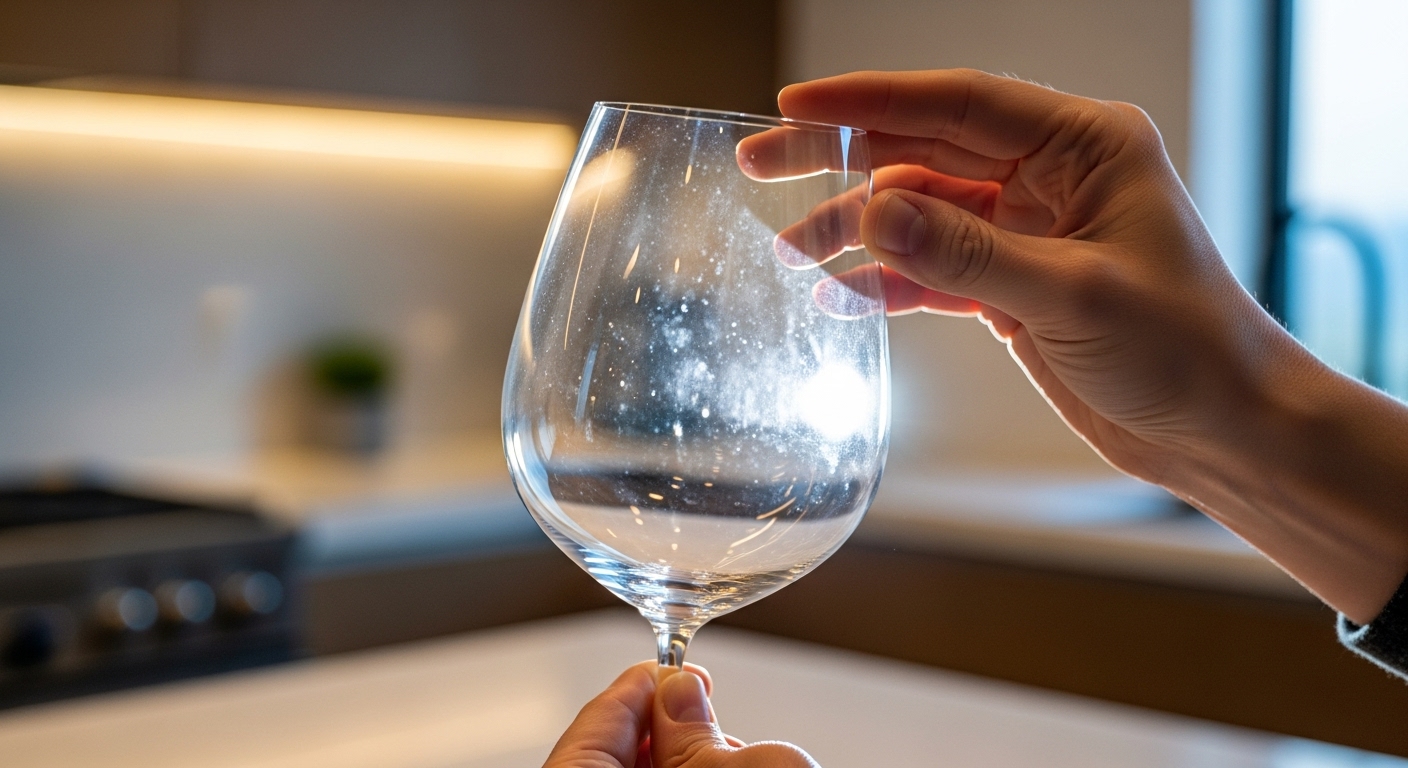Wondering how Vancouver’s water quality is secretly affecting your dishwasher’s performance and quietly shortening your washing machine’s lifespan? Even in our beautiful city known for pristine water, understanding the difference between hard and soft water could save you thousands in premature appliance replacements and skyrocketing energy bills.
Living in Vancouver, you’ve probably heard your neighbors debate whether our water is hard or soft, but here’s what most people don’t realize: even Vancouver’s relatively soft water can impact your appliances in ways that might surprise you. While we’re blessed with some of the best water quality in North America, the minerals naturally present in our supply still create subtle challenges for our household equipment over time.
The reality is that Vancouver’s water sits at around 0.3 grains per gallon with hardness levels ranging between 7.9 and 11.8 mg/L, placing it firmly in the “soft” category. However, this doesn’t mean your appliances are completely protected from water-related issues. Understanding how different water types affect your home’s equipment – and more importantly, what you can do about it – could extend the life of your appliances by years while reducing your monthly utility bills.
Whether you’re dealing with spots on your dishes, noticing your clothes don’t feel as soft after washing, or watching your energy bills creep upward, the solution often lies in understanding your water’s unique characteristics. Let’s dive into how Vancouver’s specific water profile affects your appliances and explore practical strategies to protect your investments.
Key Outtakes:
- Vancouver’s water is relatively soft at 0.3 grains per gallon, but mineral content can still impact appliances over decades of use
- Hard water can reduce appliance lifespan by 30-50%, with electric water heaters dropping from 13 years to just 6.5 years in severe cases
- Even soft water areas like Vancouver benefit from water quality monitoring, as subtle mineral buildup creates long-term efficiency losses
- Water softeners and regular maintenance can maintain original factory efficiency ratings for up to 15 years compared to untreated conditions
- Prevention strategies cost significantly less than premature appliance replacement, with payback periods as short as one year in some cases

Understanding Vancouver’s Water Quality Profile
Vancouver’s water quality story begins in the mountains and watersheds that surround our city, creating a unique mineral profile that sets us apart from other Canadian municipalities. Our water consistently tests at 7.9 to 11.8 mg/L for hardness – a level that places Vancouver squarely in the soft water category, which is defined as anything under 60 mg/L. This makes us incredibly fortunate compared to cities like Calgary, where residents regularly deal with hardness levels exceeding 200 mg/L.

What makes Vancouver’s situation interesting is how our proximity to both ocean and mountain runoff creates a mineral composition that’s different from typical inland soft water sources. While we don’t face the aggressive calcium and magnesium buildup common in prairie provinces, our water still contains trace minerals that accumulate over time. This creates what water treatment professionals call “the soft water paradox” – where residents assume their appliances are completely protected simply because local water isn’t classified as hard.
The seasonal variations in our water supply also play a role that many homeowners overlook. During heavy rainfall periods, mineral concentrations can fluctuate as different watershed sources contribute varying amounts to the overall supply. These subtle changes, while still keeping us within the soft water range, can create inconsistent conditions that affect how soap performs in your washing machine or how efficiently your dishwasher rinses dishes.
Understanding these nuances becomes crucial when you consider that about 50% of municipal water supplies across Canada have hardness levels below 80 mg/L, meaning Vancouver sits on the very soft end of an already soft spectrum. This unique position creates specific challenges and opportunities for appliance protection that generic hard water solutions don’t adequately address.
The key insight for Vancouver homeowners is recognizing that while our water won’t create the dramatic scaling issues seen in harder water areas, the cumulative effect of even minimal mineral content over 10-15 years can still impact appliance performance and efficiency. This long-term perspective shifts the focus from dramatic intervention to consistent prevention – a strategy that works particularly well in our local context.
How Different Water Types Impact Vancouver Appliances
Building on Vancouver’s unique water profile, it’s important to understand how even our relatively soft water affects different appliances throughout your home. The impact isn’t always immediately visible, which creates a false sense of security for many homeowners who assume soft water equals complete protection.

Your water heater faces the most significant challenges, even with Vancouver’s soft water. While we won’t see the dramatic efficiency losses common in hard water areas, the heating process still concentrates whatever minerals are present in our supply. Over time, this creates a thin layer of buildup on heating elements that gradually reduces efficiency. Research shows that hard water can cut efficiency by up to 48 percent in severe cases, and while Vancouver’s impact is much less dramatic, even a 5-10% efficiency loss over several years translates to noticeably higher energy bills.
Dishwashers in Vancouver homes often experience what residents mistakenly attribute to detergent issues – spots on glassware, film on dishes, and reduced cleaning performance. Even our soft water contains enough minerals to interfere with rinse cycles, especially when combined with modern low-phosphate detergents. The minerals don’t create the thick, chalky buildup seen in hard water areas, but they do accumulate in spray arms and filters, gradually reducing water pressure and distribution effectiveness.
Washing machines present an interesting case in Vancouver’s soft water environment. While clothes don’t become stiff and gray like they do in hard water areas, the subtle mineral content can still interfere with detergent performance. This often manifests as clothes that don’t feel as clean or fresh, requiring homeowners to use more detergent than necessary or wash at higher temperatures to achieve the same results. Over time, this not only increases operating costs but also puts additional wear on fabric fibers.
The misconception that soft water areas like Vancouver don’t need appliance protection stems from comparing our situation to places with obviously hard water. However, the reality is that even low mineral content creates issues over the 10-20 year lifespan of major appliances. The effects are simply more subtle and develop slowly, making them easy to overlook until efficiency has already declined significantly.
What makes Vancouver’s situation unique is how our specific mineral profile creates gradual buildup that residents often misattribute to normal aging. When a 10-year-old water heater starts taking longer to heat water or uses more energy, homeowners typically assume it’s just getting old rather than recognizing the water-related efficiency loss. This delayed recognition means problems often go unaddressed until replacement becomes necessary, rather than implementing prevention strategies that could extend appliance life considerably.
Identifying Water-Related Appliance Problems in Vancouver
The challenge with Vancouver’s soft water environment is that appliance problems develop so gradually that they’re often mistaken for normal wear and tear. Unlike areas with obviously hard water where scaling and buildup are immediately visible, our city’s water-related issues require a more trained eye to identify early warning signs.

Visual indicators in Vancouver homes tend to be subtle but consistent. Look for slight cloudiness on glassware that doesn’t disappear with normal washing, or a barely perceptible film on shower doors that builds up over weeks rather than days. Your dishwasher might leave water spots that seem inconsistent – some loads come out perfect while others show light spotting, particularly during seasons when our water’s mineral content fluctuates slightly due to different watershed contributions.
Performance indicators often provide clearer signals than visual ones in soft water environments. Your water heater might take progressively longer to reach temperature, or you might notice that your monthly energy bills are creeping upward despite similar usage patterns. Washing machines may require gradual increases in detergent amounts to achieve the same cleaning results, or clothes might not feel as soft and fresh as they did when the appliance was new.
One crucial aspect that Vancouver homeowners often overlook is how water quality can impact appliance warranties. If water quality violates the terms of your manufacturer’s warranty, that coverage may be invalid from day one. Even in soft water

